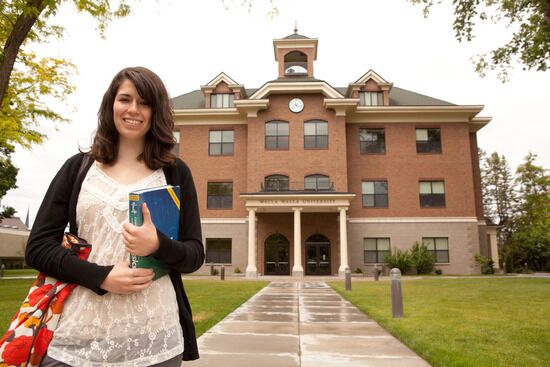The Seventh-day Adventist Church has about 118 tertiary schools around the world.1 Though many of them are within North America, you’ll also find Adventist universities in countries across the world—places like Croatia, Austria, Brazil, Madagascar, and the Philippines.
Adventist higher education is perhaps best known for theology and medical training.
But by no means do the options stop there. Among the 118 schools, you’ll find programs in many fields, from aviation to sociology and culinary arts to music. These schools are committed to supporting young people in serving God through the interests, talents, and skills He’s given them.
Do you want to learn more about Adventist higher education and what it has to offer prospective students?
Here, we’ll break down:
- Programs offered in Adventist higher education
- The origins of Adventist higher education
- What makes Adventist education different
- Resources to learn more
Let’s dive in!
What programs does Adventist higher education offer?
 Adventist higher education offers as many programs as secular universities—and then some! They offer accredited undergraduate and graduate programs with over 100 majors, depending on the school you attend.
Adventist higher education offers as many programs as secular universities—and then some! They offer accredited undergraduate and graduate programs with over 100 majors, depending on the school you attend.
These include programs in2:
- Accounting
- Agriculture
- Animation
- Archaeology
- Architecture
- Aviation
- Biology
- Business
- Chemistry
- Communications
- Computer science
- Culinary arts
- Education
- Engineering
- English
- Film
- Finance
- Fine arts
- Graphic design
- Health science
- History
- Language studies
- Law and legal studies
- Mathematics
- Mechanic and repair technology
- Music
- Philosophy
- Photography
- Physics
- Psychology
- Sociology
- Writing
Some schools have even begun to offer trade programs in auto mechanics, technology, and construction.3
While the programs available depend on where you go, almost every Adventist school has strong theology and medicine programs. And some schools specialize in these areas.
For example, Andrews University, home to the Seventh-day Adventist Theological Seminary, is one of the most popular universities at which to complete a Masters of Divinity program. It also offers a Doctor of Ministry program.
 Other Seventh-day Adventist seminaries include:
Other Seventh-day Adventist seminaries include:
- HMS Richards Divinity School (La Sierra University, California)
- Bogenhofen Seminary (Austria)
- Belgrade Theological Seminary (Serbia)
- Seventh-day Adventist Maranatha Seminary (Bangladesh)
When it comes to schools with well-known medical programs, Loma Linda University has the most popular graduate program. Meanwhile, Southern Adventist University is known for its excellent undergraduate nursing programs.
And they’re not the only ones. The following schools are also known for their medical/nursing programs:
- AdventHealth University (Florida)
- Kettering College (Ohio)
- Washington Adventist University (Washington, DC)
- Walla Walla University (Washington)
- Adventist College of Nursing and Health Sciences (Malaysia)
- Adventist University of the Philippines
- Babcock University (Nigeria)
Wondering why Adventist schools emphasize theology and medicine?
The simple reason is that Adventists are mission-oriented, seeking ways to share the gospel and serve others. Both theological and medical programs offer clear opportunities for students to use their gifts in the mission field.
But Adventist schools don’t stop there.
They’re passionate about helping every student pursue their unique calling. They encourage everyone, regardless of major, to use their talents to honor God and serve others.
When did Adventist higher education begin?
Adventist higher education began when the General Conference of Seventh-day Adventists created the Seventh-day Adventist Educational Society. In 1874, this society, with the help of some sponsors, established the first Adventist college—Battle Creek College in Battle Creek, Michigan.4
The college accepted both male and female students, which allowed women to pursue higher education at a time when educational opportunities were slowly becoming more available for them.
By its first year, the school enrolled 289 students.
This school helped students pursue higher education under the guidance of Christian values. It also taught students how to spread the gospel by providing them with biblical teaching and a mission emphasis.5
As the years passed, Battle Creek College relocated to Berrien Springs, Michigan, where it changed its name to Emmanuel Missionary College.6 The college has since been renamed Andrews University, where over 3,500 students enroll for courses every year.7
Adventist education has come a long way since 1874. In fact, it’s now the largest Protestant education system in the world with over 7500+ schools across the globe.8
What makes Adventist education different?

Though Adventist schools have many similarities academically to other schools, what makes them different is how they’re shaped by the biblical values that Adventists hold.
The schools express these values through:
- Offering religious programs and worship opportunities unique to Adventism: These include times of morning and evening worship, weeks of prayer, vespers to begin and end Sabbath, and Sabbath services.
- Integrating faith into the curriculum: They present their course material from a biblical worldview. Teachers may also make time for prayer and devotionals in class.
Forming partnerships with local Seventh-day Adventist churches: They may work with a local church to serve the spiritual needs of their students. - Having university chaplains: They have chaplains who can provide mentorship and spiritual guidance for young people.
- Hiring Adventist staff and teachers: They hire Adventist staff to promote a Christian environment.
- Keeping Sabbath: The campus schedule fosters an environment of Sabbath keeping for students and staff from Friday evening to Saturday evening.
- Serving healthy (often vegetarian) food: Adventist schools promote healthy living through the food served in their cafeterias.
- Having community service and mission opportunities: Adventist schools encourage students to help their community and those in need. They also offer mission trips where students can serve others while gaining cultural experiences.
- Having work-study programs: They offer work-study programs so students can gain practical experience while paying off their tuition.
With the uniqueness of these schools come many advantages. We’ll look at some of those next.
What are the advantages of Adventist higher education?

Photo by Naassom Azevedo on Unsplash
The biblical emphasis and promotion of Christian values is one of the big advantages of attending an Adventist college. But there’s more.
Here are some key advantages:
- Smaller campuses: Most Adventist schools tend to be on the smaller side. This allows the campus community to become a more tight-knit group, making it easier for students to find friendships. It also helps students receive more one-on-one assistance from their teachers.
- Support from teachers and staff: Adventist teachers seek to encourage their students and mentor them. Some staff will even invite students to their homes on Friday or Sabbath evenings.
- A Bible-centered curriculum: Students receive instruction from a biblical perspective and learn how to apply their beliefs in practical ways.
- A whole-person education: Adventist schools aren’t just concerned about students getting good grades. They’re concerned with how students are growing in every sphere of life. They want students to grow spiritually, mentally, physically, and emotionally.
These wonderful advantages of Adventist education didn’t come about by chance. They were inspired by what Adventist pioneer Ellen White wrote about Christian schools.9
In her book Education, she emphasized that Christian education was never just about developing students’ intellect. It was about developing their entire being—for now and eternity:
“True education means more than the perusal of a certain course of study. It means more than a preparation for the life that now is. It has to do with the whole being, and with the whole period of existence possible to man. It is the harmonious development of the physical, the mental, and the spiritual powers. It prepares the student for the joy of service in this world and for the higher joy of wider service in the world to come.”10
These advantages do come with a price tag, though. Adventist schools are often pricey today. But thankfully, the cost doesn’t have to stop any student who desires a Christian education. Many of these schools offer financial aid, scholarships, and other opportunities that we’ll cover in the following section.
Are there affiliated programs or sponsorship options?
Yes, Adventist schools offer affiliated education programs and sponsorship opportunities.
Affiliated education programs are formed between Adventist universities and other schools or organizations.11 They allow students to build networks with other schools and often offer dual-enrollment programs.
Many schools also provide sponsorship opportunities for their students. Schools will often partner with local churches or organizations to sponsor students through grants or scholarships.12 This way, students, regardless of their financial abilities, can benefit from the education offered at an Adventist institution.
How to learn more about Adventist higher education

Photo by Mimi Thian on Unsplash
If you’re looking into Adventist education to see if it’s right for you, these resources will help you in your search:
- Adventist Education: This website provides general information about Adventist education.
- Adventist Colleges and Universities: Here, you’ll find links to Adventist college websites and a list of the majors Adventist schools offer. There’s even a page about financial aid.
- Adventist Education Department: This is the official website of the General Conference Education Department.
- Adventist Locator: This site provides the locations of Adventist schools in North America. Just type an area or school name in the search bar, and it’ll give you a map of its location.
- Adventist Directory: This site contains a list of every Adventist school in existence. Just click on the world divisions tab, select your division, and select the education tag under sub-entities to pull up a list. It’ll give you the names of schools in that area, their accreditation status, and website addresses for specific schools.
- Adventist Accrediting Association: This website lists all Adventist schools. It also provides regular evaluations of these schools’ accreditation status.
- Adventist Colleges Abroad: This site talks about study-abroad opportunities.
- Seventh-day Adventist Education Statistics: You can find enrollment data here. It will also tell you how many schools and educators there are on the primary, secondary, and tertiary levels.
- Adventist International Institute of Advanced Studies: This provides the philosophy of Adventist education.
- Adventist Archives: This page contains information about the development of Adventist education throughout history.
Adventist education is unique in that it prepares students not only for the workplace but also for a lifetime of following Jesus. It seeks to develop them mentally, spiritually, and physically.
If that sounds like something you’d be interested in, we encourage you to look into Adventist schools near you. God might be leading you to the school that will jump-start your career and grow your spiritual life.
Want to learn more about what the Adventist school system has to offer?
Related pages
- “Seventh-day Adventist Education Statistics,” Seventh-day Adventist Education Department, Seventh-day Adventist World Church, https://www.adventist.education/education-statistics/. [↵]
- “Undergraduate Areas of Study,” Adventist Colleges and Universities. [↵]
- “Applied Technology,” Southern Adventist University. [↵]
- Erickson, Charlotte, “Battle Creek Academy,” Encyclopedia of Seventh-day Adventists. [↵]
- “Timeline of Seventh-day Adventist Education,” Adventist Archives. [↵]
- Ibid. [↵]
- “About Andrews,” Andrews University. [↵]
- “About History,” Loma Linda Academy. [↵]
- Rasi, Humberto M, “Education, by Ellen G. White,” Encyclopedia of Seventh-day Adventists. [↵]
- White, Ellen G. 1903. Education. Pacific Press Publishing Association, p. 3. [↵]
- “About WAU,” Washington Adventist University. [↵]
- “How to Pay for College,” Adventist Colleges and Universities. [↵]
More Answers
Do Seventh-Day Adventists Have “Rules” For Clothing?
Many religions have guidelines on dress, but what about the Adventist Church? Discover how Adventists choose to dress based on biblical principles.
11 Reasons People Become Seventh-day Adventists
Curious why many people become Adventists? Here are elements of Adventist beliefs, values, and mission often reflected in people’s decisions to join.
What’s the Seventh-day Adventist General Conference Session?
At the General Conference Session, Adventist delegates from around the world gather to assess the state of the organization, pray, and discuss current issues. Here’s how it works.
How Adventists View the End of the World
The end of the world is no fun to think about. But here’s how we can actually find hope and comfort in what’s to come.
What Is an Adventist Medical Missionary?
A medical missionary in the Adventist Church is someone who cares for the medical needs of people as a way of showing the love of Jesus. They may travel to another country, or even just serve in their hometown.
Is the Seventh-day Adventist Church Protestant?
Learn how the beliefs of the Seventh-day Adventist Church align with the “5 solas” of Protestantism.
Are Seventh-day Adventists Evangelicals?
According to its origins and definition, evangelicalism is about following Jesus and the Bible and sharing the Gospel through the way we live our lives. Adventists wholeheartedly harmonize with these principles.
Could Anything Keep Me from Becoming an Adventist?
We are each saved through Christ. But when it comes to church membership, are there certain beliefs or expectations to become an Adventist?
Do Seventh-day Adventists Have “Rules”?
We uphold principles we believe will help us maintain a closer relationship with Jesus and His Word. Learn how these principles guide Adventist lifestyles.
Do Seventh-day Adventists Have “Rules” For Marriage?
Around the world, many cultures and religions have various marriage traditions, expectations, or even rules when it comes to choosing a partner, planning the wedding, extended family logistics, or a number of other things.
Can a Seventh-day Adventist Marry a Non-Adventist?
Yes. Seventh-day Adventists are not under any official rules that dictate who they can or cannot marry. This is a personal, life-altering decision between the couple and God.
What Adventists Believe About Alcohol and Tobacco Use
The Seventh-day Adventist Church has historically discouraged the use of alcohol and tobacco. Even before the church started in 1863, its leaders were realizing the negative effects of these substances.
Jewelry—Why Do Many Seventh-day Adventists Choose Not to Wear It?
If you walk into a Seventh-day Adventist church service, you might notice that many people aren’t wearing earrings, bracelets, necklaces, or sometimes even wedding rings.
International Pathfinder Camporee
Youth aged 10-15 in the Adventist Church’s global Pathfinder program look forward to the International Camporee every 5 years. This event brings together Pathfinders from around the world for exciting activities.
How Adventists interpret Bible prophecy
Bible prophecy conjures up a variety of emotions in people. For some, it feels exciting or mysterious.
Moviegoers’ Guide to The Hopeful: The Facts Behind the Film
Learn where and when you can watch The Hopeful and how to get tickets. Already seen it? We’ll uncover the real story that inspired this film.
How Are Seventh-day Adventists Different from Other Protestants?
As a Protestant Christian denomination, the Seventh-day Adventist Church regards the Bible as the ultimate guide and looks to Jesus Christ as the only way to salvation. We do have some differences of belief or interpretation when it comes to topics like Bible prophecy, end-time events, the Sabbath, and a person’s state after death.
How Adventists Handle Death and Funerals
Most Seventh-day Adventist funeral services are similar to those of other Protestant denominations, such as Methodists, Baptists, or Presbyterians, but you might find a few differences or unique nuances.
Adventist Culture
Many Seventh-day Adventists adhere to specific lifestyle principles that can make them stand out from those in other Christian denominations. Whether it’s going to church services on Saturday or eating the popular Adventist entrée of “haystacks.”
Do Adventists Observe Easter-Related Holidays?
Jesus Christ’s resurrection, celebrated on many Easter-related holidays, is central to the beliefs of the Seventh-day Adventist Church. And that means we seek every opportunity to remember it.
The Ten Commandments from a Seventh-day Adventist Perspective
Ever eaten a salad and gotten a big piece of green stuck in your teeth? And you didn’t realize it was there until you looked in the mirror? (Because no one ever told you!)
The Benefits of A Seventh-day Adventist Academy
Adventist academies are high schools (grades 9-12) that are owned and operated by the Seventh-day Adventist Church.
Are Seventh-day Adventists Christians?
Yes, the Seventh-day Adventist Church is a Protestant Christian denomination formed in 1863. Just like other Christians, we believe that Jesus Christ is our Savior and seek to follow the principles of the Word of God.
Adventist Movies: Where Faith and Film Meet
The Adventist Church uses film to share our faith and uplift positive values. Learn more about specific Adventist-produced films and where to find them.
Do Adventists Celebrate Christmas?
In general, most Seventh-day Adventists do celebrate Christmas.
Since our denomination doesn’t have specific guidelines about holidays, it’s up to each member to decide whether to celebrate it based on their personal convictions and study of the Bible.
What Does the Bible Say About Modesty
Seventh-day Adventists and Christians in general try to ensure their outward presentation and lifestyle glorify God. This often involves daily habits like the ways we hold conversations, the ways we dress and accessorize, and the ways we regard other people when we’re out and about.
How Do Adventists Make Movie and Music Choices?
How do Adventists decide what music to listen to and which movies to watch? Learn how Bible principles can help us make better entertainment choices.
Does the Seventh-day Adventist Church Believe in Paying Tithe?
Seventh-day Adventists believe in paying tithe and offerings based on the biblical command and our commitment to being wise stewards of God’s resources. These donations help fund the mission of the Adventist Church by supporting pastors, missionaries, church expenses, and evangelistic projects, among other things.
Seventh-day Adventist World Population and Demographics
The Adventist Church has more than 22 million members and 100,000 churches worldwide, plus a large system of hospitals, schools, and publishing houses. Learn more about this diverse church.
Didn’t find your answer? Ask us!
We understand your concern of having questions but not knowing who to ask—we’ve felt it ourselves. When you’re ready to learn more about Adventists, send us a question! We know a thing or two about Adventists.































